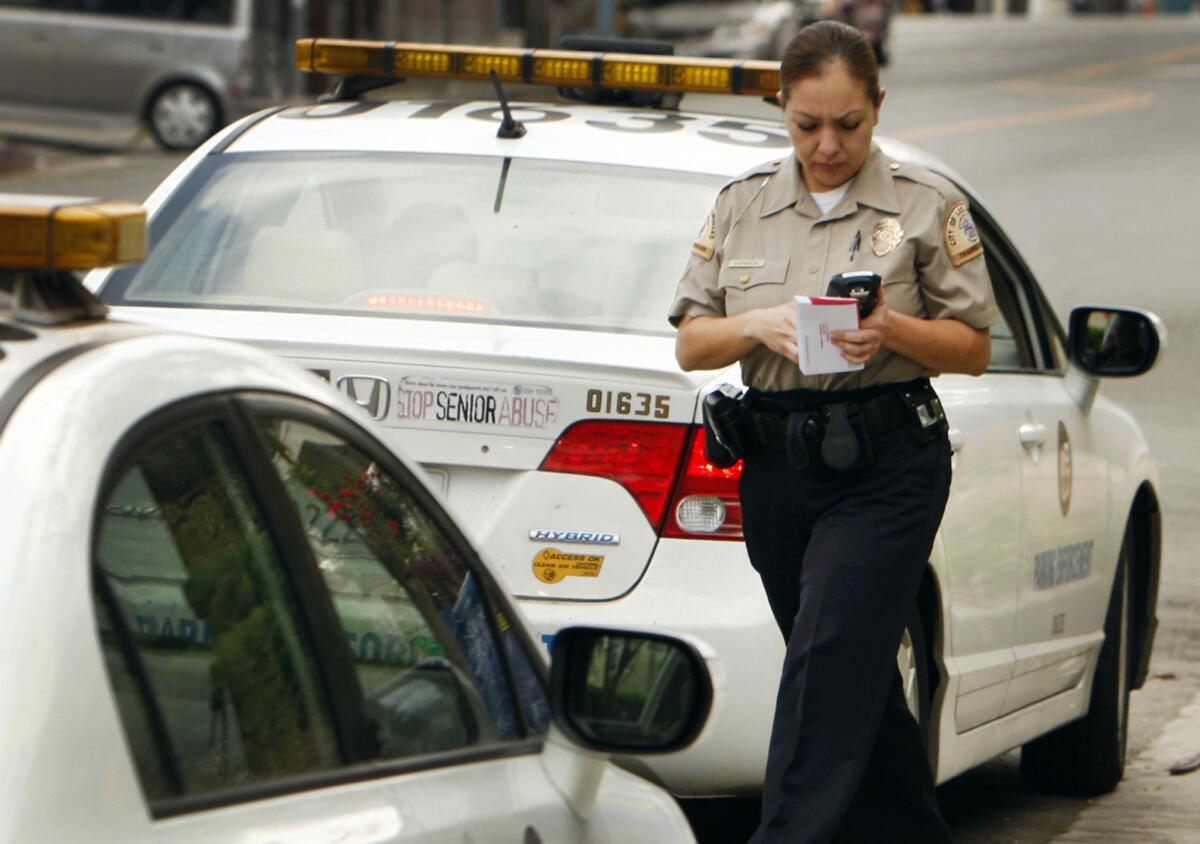What should a parking ticket in L.A. cost?

- Share via
How much should a parking ticket at an expired meter cost? In the city of Los Angeles, that ticket will set you back $63 — and if the ticket is sitting on your windshield, you probably think that’s too much to pay. The pricing of fines is just one issue that a mayoral working group on parking regulations will examine over the next five months. According to community activists and public policy experts on that task force — as well as Mayor Eric Garcetti — the parking system in Los Angeles is due for reform.
The working group is wisely looking at the overall picture of parking in a city with thousands of miles of streets and tens of thousands of parking spaces at meters and in public garages. How should Los Angeles promote regular turnover of spaces so that more people can have a shot at one, and how should it decrease constant block circling in the hunt for an open space while still allowing people to park long enough to do what they need to do? Should the metered time be 20 minutes or two hours? Should meters operate until 6 p.m. or 8 p.m. or 1 a.m.? Of course, the answers to these questions vary by neighborhood; there’s no one-size-fits-all policy.
But certainly the thorniest issue the task force will take on is parking fines, particularly at meters. One reason the group was created was to respond to the grass-roots Parking Freedom Initiative, which contends that fines are too high and vows to launch a parking reform ballot measure if the city doesn’t make changes.
That’s probably a popular position. Drivers — and many business owners — have been outraged by parking meters since they were first planted on streets in Oklahoma City in 1935 and denounced as practically un-American, a tax on public roads. It sometimes feels like the authorities are lying in wait for meters to suddenly flash red so they can slap a ticket on a car. And it’s aggravating that whether you’re two minutes late or two hours late, the ticket price is the same. It seems unfair that a high-paid television executive and a minimum-wage worker pay the same price for a ticket.
But the fact is that L.A.’s $63 parking tickets are roughly comparable to those in New York and Chicago, and lower than those in San Francisco.
And even though no one likes paying them, that’s not a good enough reason to lower the fines. Most experts agree that policymakers should think about fines this way: They should be sufficient to cover the cost of parking enforcement and high enough to disincentivize flouting the rules.
In recent years — and especially during the tough years of the economic downturn — the city has increasingly turned to parking fines as a way to help close budget deficits. The price of a ticket for overstaying a meter steadily rose from $40 in 2006 to $63 in 2012, and officials have repeatedly acknowledged that the purpose was to bring in cash. This year, the city expects parking tickets to generate about $161 million in revenue.
We understand the temptation to keep raising ticket prices to cover general fund costs, especially in a city where it is hard to raise taxes because they must be approved by a popular vote. But the city should try to wean itself from this habit; it makes a lot more sense (and would generate less anger) to set fines in a clear, rational manner that is more closely related to their purpose.
The city should also examine whether fines can be made more equitable. Fines for parking during street-sweeping hours hit lower-income apartment-dwellers harder because they often have only on-street parking and must scramble to find other spots. Also, a survey of 2009 violation data for the city’s Department of Transportation found that 8% of cars cited for violating parking meter rules were responsible for about 30% of the citations. One way of addressing that sort of recidivism would be to charge repeat offenders graduated fines, rising steeply with each multiple offense in a year. A spokeswoman for Garcetti said he was open to the idea of graduated fines and had also talked about creating an incentive program for violators: Pay your parking ticket early and get a reduction in the fine.
There are plenty of innovative ideas out there for better managing all aspects of street parking, and the mayor’s working group should examine them.
More to Read
A cure for the common opinion
Get thought-provoking perspectives with our weekly newsletter.
You may occasionally receive promotional content from the Los Angeles Times.









